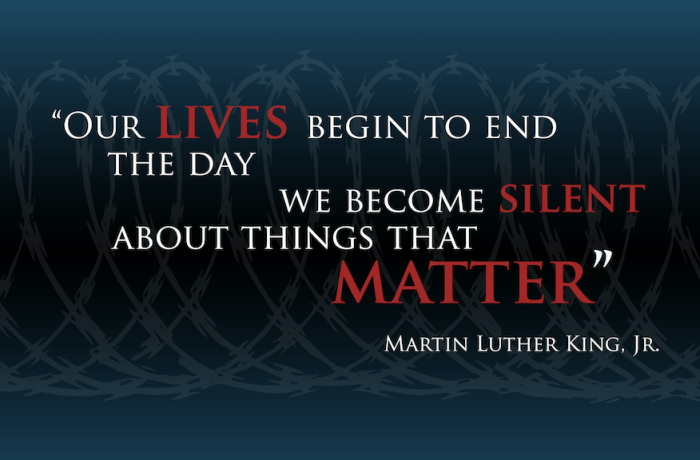“Whites, it must frankly be said, are not putting in a similar mass effort to reeducate themselves out of their racial ignorance. It is an aspect of their sense of superiority that the white people of America believe they have so little to learn.”
-Rev. Dr. Martin Luther King, Jr., in his 1967 book Where Do We Go from Here: Chaos or Community?
Remington Gregg reminded me of that observation today in this Twitter thread “on lesser quoted words of Dr. King and sitting in your discomfort as a white person in America.”
As 2020 began, one of my goals was to put a lot of writing energy into coverage of racial disparities or other topics particularly impacting people of color in Iowa. I got off to a decent start a few days into the year with a deep dive on Julián Castro’s critique of the Iowa caucuses, which was partly grounded in this state’s relative lack of diversity. I marked the last Martin Luther King, Jr. Day with a post about an exhibit on “redlining” and other racist housing policies in Des Moines. That piece ended up among the 25 most-viewed that Bleeding Heartland published during a year of higher traffic than ever.
But as the year progressed, other pressing political topics–the Iowa caucuses and their aftermath, turnover on the Iowa Supreme Court, the Iowa legislative session, a huge number of competitive election campaigns, and of course the the coronavirus pandemic–consumed most of my headspace.
TAKING STOCK
Only about fifteen of the 310 Bleeding Heartland posts I wrote during 2020 were oriented toward matters of race or ethnicity. They included reviews of the racial disparities apparent in the spread of COVID-19, which quickly widened in communities of color, due to outbreaks in food processing plants.
I also profiled the record number of people of color who ran for and were later elected to the Iowa legislature. Bleeding Heartland was the first media outlet to profile Ricki Sue King, who made history last summer as the first Black Iowan to qualify for the ballot as a presidential candidate.
My decade-long interest in Iowa’s terrible disenfranchisement policies fueled several posts in 2020 about efforts to lobby Governor Kim Reynolds to sign an executive order restoring voting rights to most Iowans with felony convictions. I plan to keep following this issue, because only a small fraction of the newly eligible voters registered before the November election.
The biggest disappointment for me: although I have long been interested in policing reform, especially in Waterloo, I wrote very few pieces on that subject during 2020. In part that’s because many other Iowa news organizations–both mainstream media and the Iowa Informer website–were extensively covering the Black Lives Matter protests and reaction to that social movement. (I often lean toward topics not getting attention elsewhere.) Several guest authors wrote about the summer’s campaign for racial justice. Still, I wish I’d done more on that front as well.
A RESOLUTION
I didn’t make many blog-related New Year’s resolutions for 2021, but I promise today to make a concerted effort to provide more coverage of these topics. You can help by sending story ideas. I won’t have time to write up every one, but I greatly appreciate tips on any local or statewide issue relating to race or racial disparities. I’d rather hear about something several times than miss a newsworthy story. Here’s how to reach me.
If you have a unique perspective to share or feel strongly that Bleeding Heartland should be covering a story, consider becoming a guest author. A number of writers highlighted topics related to racial justice or discrimination last year; I’ve linked to some of them below, to give you a sense of the range of possibilities. I have no word limits or standard format, so writers have a lot of freedom to express themselves. Contact me for details on the process if you are interested.
I also want to provide a platform for more diverse voices here. Out of around 140 guest authors who wrote for this website in 2020, only about a dozen were people of color. (I don’t have an exact total, because I don’t always know a contributor’s race or ethnicity.)
Important note: This site will never force authors into silos. People of color can write about discriminatory hiring practices, a “culture of non-inclusion,” and the need for bold action on racial justice or racial profiling or Black maternal health, of course. But they can also write about health care or a local renewable energy initiative or any kind of activism or campaigning.
By the same token, white authors can write for Bleeding Heartland about racism or racial disparities, as I have done from time to time. However, white people will never have the same authority to speak about those issues as do Iowans who experience racism on a regular basis.
___________
Appendix: A sampling of guest posts Bleeding Heartland published during 2020 that focused on racism, discrimination, or matters of racial justice
Charles Bruner, Reframing racism
Dan Guild, Democratic presidential primary schedule needs serious evaluation
Stacey Walker, Where are the freedom fighters? A plea for help from a beleaguered Black man
Herb Strentz, Perhaps Justice should rear its head, too
Ira Lacher, What’s a white person to do?
Joe Henry, Des Moines hiring practices don’t reflect community’s diversity
Nick Mahlstadt, Response to Senator Julian Garrett’s racist dog whistle
Erika Brighi, My awakening moment in the fight for justice
David Grussing, Thoughts on removal of Confederate monuments
Marty Ryan, Minority impact statements in Iowa: History and continuing efforts
Preethi Reddi, Rural Iowa schools must proactively promote racial equity
Jeff Walberg, To see the racism of Kenosha, look beyond the videos

